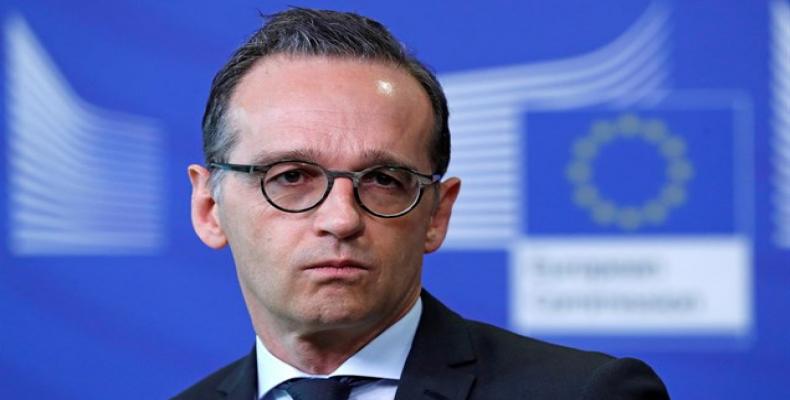Warsaw, August 1 (RHC)-- Germany has officially turned down a request by the United States to join its international naval force, which is supposed to protect vessels from an alleged Iranian threat as they pass through the Strait of Hormuz.
German Foreign Minister Heiko Maas told reporters that there was no military solution to the ongoing standoff in the region and Berlin would rather pursue a policy that prevents further escalation of tensions. "Germany will not take part in the sea mission presented and planned by the United States," Maas told reporters on a trip to Warsaw, the Polish capital.
Earlier this week, the U.S. Embassy in Berlin said the administration of President Donald Trump had asked the German government to join France and Britain in a mission to secure shipping through the strait and combat what it claimed to be "Iranian aggression."
The Trump administration has, without providing any evidence, blamed Iran for recent mysterious attacks against oil tankers sailing through the Sea of Oman, near the Strait of Hormuz. Iran has vehemently denied the accusation, warning regional countries about possible "false flags" by foreign players.
The tensions come as ties between Tehran and Washington have deteriorated since May 2018, when Trump abandoned the 2015 nuclear deal with Iran and reimposed sanctions against the Islamic Republic. Germany, France and Britain -- three European signatories to the deal, which was also signed by Russia and China -- have tried to keep it alive by protecting bilateral trade through a special payment channel.
A German government spokeswoman said that Berlin had not made an offer to join the US-led mission because it wanted to see the situation de-escalated. "The government is reticent about the concrete US proposal and so has not made an offer," deputy government spokeswoman Ulrike Demmer told a news conference after a cabinet meeting.
"For us, it is important to pursue the avenue of diplomacy... and to seek talks with Iran to achieve a de-escalation, and to work towards the continuation of the nuclear deal," Demmer said. "Participating in a U.S.-led mission could make this harder. "
German Defense Minister Annegret Kramp-Karrenbauer said earlier in the day that Berlin was exploring its options and had yet to respond to the United States. "We now have a first general request from the United States, the other international partners for a possible mission," she told reporters before a meeting with NATO Secretary-General Jens Stoltenberg in the Belgian capital Brussels.
"We are reviewing these requests, in close cooperation with Britain and France, and we are doing this against the backdrop of our political and diplomatic goals and in this overall assessment a corresponding decision will be taken," she said.
German Finance Minister and Vice Chancellor Olaf Scholz also said a US-led mission could cause an even bigger conflict. "I'm very skeptical about that, and I think that's a skepticism that many others share," said Scholz, who chaired the cabinet meeting on Wednesday as Chancellor Angela Merkel was away on holiday.
Norbert Roettgen, a member of Merkel's conservative bloc, said he believed Germany should not join the US-led mission but he could see Berlin being part of an all European mission.
"The alternative is a European mission, if necessary without the British, if they decide for the US," Roettgen, chairman of the Bundestag's foreign relations committee, told broadcaster ZDF.
Demmer also said that, in principle, Berlin "continues to regard the proposal of a maritime protection mission by European countries as worth considering."
The UK has been leading its own efforts to form a European force for the Persian Gulf after Iran seized a British-flagged tanker in the Strait of Hormuz over violating international laws and injuring the crew of a Iranian small fishing boat in a dangerous collision.
Iran and the UK came at loggerheads earlier this month, when the UK seized an Iranian tanker Grace 1 on the grounds that it was carrying oil to Syria in violation of the EU's sanctions against the Arab country.
Iran says the ship was traveling in international waters and was not heading to Syria, accusing the UK of piracy.


